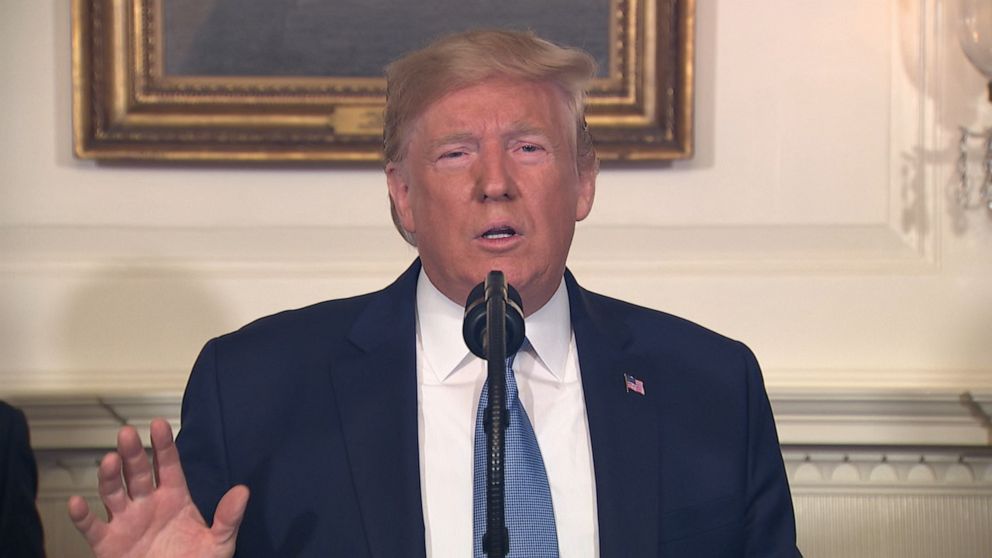Assailing Hate, but Not Guns.
指責(zé)仇恨,卻不指責(zé)槍支。
By Michael Crowley and Maggie Haberman
文/邁克爾·克勞利,瑪吉·哈伯曼
WASHINGTON — President Trump on Monday denounced white supremacy in the wake of twin mass shootings over the weekend,
華盛頓——上周末,美國(guó)連續(xù)發(fā)生兩起大規(guī)模槍擊案,周一,特朗普總統(tǒng)對(duì)白人至上主義予以了譴責(zé),
and citing the threat of “racist hate,” he summoned the nation to address what he called
還援引“種族仇恨”威脅,他甚至還稱,這次的慘案與帶有暴力色彩的視頻游戲、
a link between the recent carnage and violent video games, mental illness and internet bigotry.
精神疾病及互聯(lián)網(wǎng)上的偏執(zhí)情緒大有關(guān)聯(lián),全國(guó)人民應(yīng)該團(tuán)結(jié)起來(lái)解決這一問(wèn)題。
But he stopped well short of endorsing the kind of broad gun control measures that activists, Democrats and some Republicans have sought for years,
但對(duì)社會(huì)活動(dòng)家、民主黨人和部分共和黨人多年來(lái)一直尋求的普遍的槍控措施,
such as tougher background checks for gun buyers and the banning of some weapons and accessories such as high-capacity magazines.
比如加強(qiáng)對(duì)購(gòu)買槍支者的背景審查,禁止使用某些特定武器和大容量彈匣等配件,他依然沒(méi)有任何表示。
And while he warned of “the perils of the internet and social media,”
他還對(duì)“互聯(lián)網(wǎng)和社交媒體的危險(xiǎn)性”發(fā)出了警告,
he offered no recognition of his own use of those platforms to promote his brand of divisive politics.
卻只字未提自己利用這些平臺(tái)宣傳其政治主張一事。
Instead, he focused on a rising intolerance that he has been slow to condemn in the past.
相反,他將重點(diǎn)放在了一直在發(fā)酵,過(guò)去他卻遲遲沒(méi)有譴責(zé)的偏狹思想上。
“In one voice our nation must condemn racism, bigotry and white supremacy,” Mr. Trump said at the White House.
“我們應(yīng)該一致譴責(zé)種族主義、偏執(zhí)和白人至上,”特朗普在白宮說(shuō)道。
“These sinister ideologies must be defeated.”
“我們必須擊敗這些邪惡的思想。”
It seemed unlikely that Mr. Trump’s 10-minute speech, coming after one of the most violent weekends in recent American history,
經(jīng)歷了美國(guó)近代史上最暴力的一個(gè)周末,加之很多美國(guó)民眾都指責(zé)特朗普煽動(dòng)種族分裂,
would reposition him as a unifier when many Americans hold him responsible for inflaming racial division.
他的這一長(zhǎng)達(dá)10分鐘的演講似乎不太可能將其重塑成一個(gè)消除分歧之人。
He took no responsibility for the atmosphere of division,
但特朗普拒絕對(duì)種族分裂的形勢(shì)負(fù)責(zé),
nor did he recognize his own reluctance to warn of the rise of white nationalism until now.
而且,直到現(xiàn)在,他也沒(méi)有意識(shí)到自己不愿意警告民眾白人民族主義正在崛起。

Speaking at a lectern beneath a portrait of George Washington in the Diplomatic Reception Room,
在外交接待室喬治·華盛頓畫像下的講臺(tái)上,
Mr. Trump read from a teleprompter as he denounced the bilious anti-Hispanic manifesto of the suspect in the El Paso shooting,
特朗普看著提詞器,對(duì)釀成22人死亡的埃爾帕索槍擊案的嫌疑人惡毒的反西班牙裔宣言予以了譴責(zé),
which killed 22 people, as being “consumed by racist hate.”
稱他“被種族仇恨吞噬了”。
He also called it part of an “evil contagion” spreading online.
他還稱這一慘案是網(wǎng)上正在傳播的“邪惡風(fēng)氣”的一部分。
“These barbaric slaughters are an assault upon our communities, an attack upon our nation and a crime against all of humanity,”
“這些野蠻的屠殺是對(duì)我們社會(huì)的攻擊,是對(duì)我們國(guó)家的攻擊,是對(duì)全人類的犯罪,”
Mr. Trump said of the massacre in El Paso on Saturday and another in Dayton, Ohio, on Sunday —
特朗普談及周六發(fā)生在埃爾帕索及周日發(fā)生在俄亥俄州代頓的兩起槍擊案時(shí)說(shuō)道——
at one point incorrectly referring to Toledo as the site of those killings.
他還一度錯(cuò)誤地將托萊多說(shuō)成是兩次槍擊案的案發(fā)地。
The Dayton gunman is not known to have had a political motive.
代頓槍擊案的兇手是否存在政治動(dòng)機(jī)目前尚不清楚。
Between the two shootings, 31 people have now died.
兩起槍擊事件目前已經(jīng)造成31人死亡。
Mr. Trump, who will visit Dayton and El Paso on Wednesday, took no questions.
周三即將訪問(wèn)代頓和埃爾帕索的特朗普沒(méi)有回答任何問(wèn)題。
He also did not repeat his call on Twitter earlier in the morning
早前他還在推特上呼吁共和黨和民主黨共同努力,
for Republicans and Democrats to work together to strengthen background checks for prospective gun buyers.
加強(qiáng)對(duì)潛在槍支購(gòu)買者的背景審查力度,如今對(duì)此已經(jīng)閉口不提。
譯文由可可原創(chuàng),僅供學(xué)習(xí)交流使用,未經(jīng)許可請(qǐng)勿轉(zhuǎn)載。


